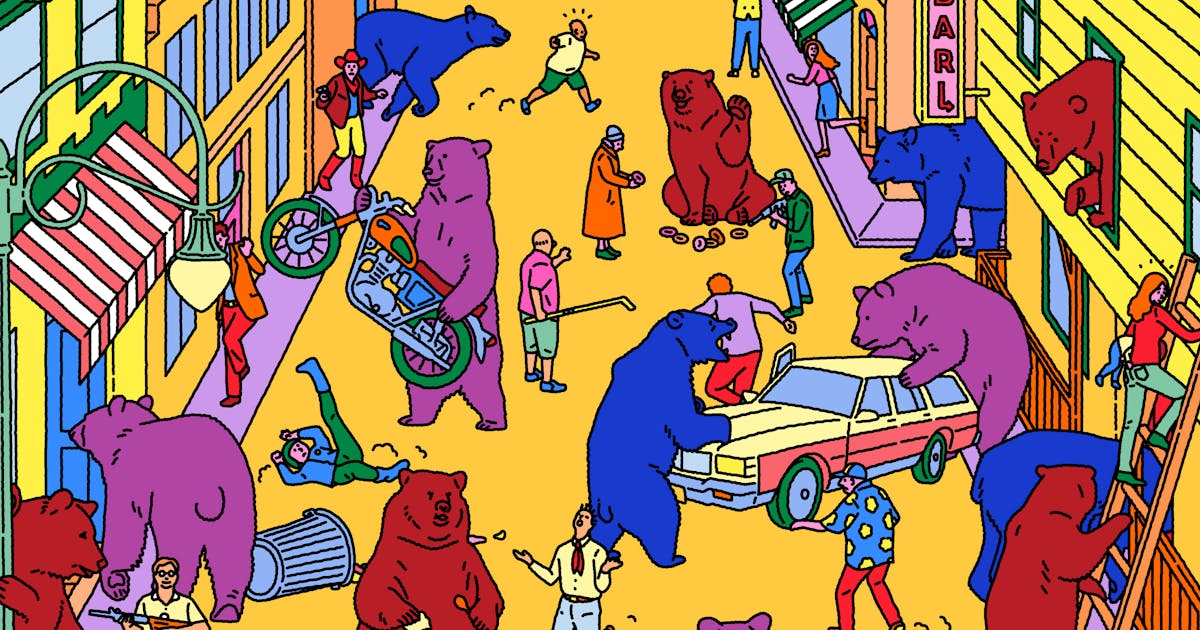
The Town That Went Feral
When a group of libertarians set about scrapping their local government, chaos descended. And then the bears moved in.
Hongoltz-Hetling is an accomplished journalist based in Vermont, a Pulitzer nominee and George Polk Award winner. A Libertarian Walks Into a Bear: The Utopian Plot to Liberate an American Town (and Some Bears) sees him traversing rural New England as he reconstructs a remarkable, and remarkably strange, episode in recent history. This is the so-called Free Town Project, a venture wherein a group of libertarian activists attempted to take over a tiny New Hampshire town, Grafton, and transform it into a haven for libertarian ideals—part social experiment, part beacon to the faithful, Galt's Gulch meets the New Jerusalem. These people had found one another largely over the internet, posting manifestos and engaging in utopian daydreaming on online message boards. While their various platforms and bugbears were inevitably idiosyncratic, certain beliefs united them: that the radical freedom of markets and the marketplace of ideas was an unalloyed good; that "statism" in the form of government interference (above all, taxes) was irredeemably bad. Left alone, they believed, free individuals would thrive and self-regulate, thanks to the sheer force of "logic," "reason," and efficiency. For inspirations, they drew upon precedents from fiction (Ayn Rand loomed large) as well as from real life, most notably a series of micro-nation projects ventured in the Pacific and Caribbean during the 1970s and 1980s.
Although John's bids for high office failed, his ambitions remained undimmed, and in 2004 he and Rosalie connected with a small group of libertarian activists. Might not Grafton, with its lack of zoning laws and low levels of civic participation, be the perfect place to create an intentional community based on Logic and Free Market Principles? After all, in a town with fewer than 800 registered voters, and plenty of property for sale, it would not take much for a committed group of transplants to establish a foothold, and then win dominance of municipal governance. And so the Free Town Project began. The libertarians expected to be greeted as liberators, but from the first town meeting, they faced the inconvenient reality that many of Grafton's presumably freedom-loving citizens saw them as outsiders first, and compatriots second—if at all. Tensions flared further when a little Googling revealed what "freedom" entailed for some of the new colonists. One of the original masterminds of the plan, a certain Larry Pendarvis, had written of his intention to create a space honoring the freedom to "traffic organs, the right to hold duels, and the God-given, underappreciated right to organize so-called bum fights." He had also bemoaned the persecution of the "victimless crime" that is "consensual cannibalism." ("Logic is a strange thing," observes Hongoltz-Hetling.)
If the Libertarian vision of Freedom can take many shapes and sizes, one thing is bedrock: "Busybodies" and "statists" need to stay out of the way. And so the Free Towners spent years pursuing an aggressive program of governmental takeover and delegitimation, their appetite for litigation matched only by their enthusiasm for cutting public services. They slashed the town's already tiny yearly budget of $1 million by 30 percent, obliged the town to fight legal test case after test case, and staged absurd, standoffish encounters with the sheriff to rack up YouTube hits. Grafton was a poor town to begin with, but with tax revenue dropping even as its population expanded, things got steadily worse. Potholes multiplied, domestic disputes proliferated, violent crime spiked, and town workers started going without heat. "Despite several promising efforts," Hongoltz-Hetling dryly notes, "a robust Randian private sector failed to emerge to replace public services." Instead, Grafton, "a haven for miserable people," became a town gone "feral." Enter the bears, stage right.
Grappling with what to do about the bears, the Graftonites also wrestled with the arguments of certain libertarians who questioned whether they should do anything at all—especially since several of the town residents had taken to feeding the bears, more or less just because they could. One woman, who prudently chose to remain anonymous save for the sobriquet "Doughnut Lady," revealed to Hongoltz-Hetling that she had taken to welcoming bears on her property for regular feasts of grain topped with sugared doughnuts. If those same bears showed up on someone else's lawn expecting similar treatment, that wasn't her problem. The bears, for their part, were left to navigate the mixed messages sent by humans who alternately threw firecrackers and pastries at them. Such are the paradoxes of Freedom. Some people just "don't get the responsibility side of being libertarians," Rosalie Babiarz tells Hongoltz-Hetling, which is certainly one way of framing the problem.
Meanwhile, the dreams of numerous libertarians came to ends variously dramatic and quiet. A real estate development venture known as Grafton Gulch, in homage to the dissident enclave in Ayn Rand's Atlas Shrugged, went belly-up. After losing a last-ditch effort to secure tax exemption, a financially ruined Connell found himself unable to keep the heat on at the Meetinghouse; in the midst of a brutal winter, he waxed apocalyptic and then died in a fire. Franz quit his survivalist commune, which soon walled itself off into a prisonlike compound, the better to enjoy freedom. And John Babiarz, the erstwhile inaugurator of the Project, became the target of relentless vilification by his former ideological cohorts, who did not appreciate his refusal to let them enjoy unsecured blazes on high-wildfire–risk afternoons. When another, higher-profile libertarian social engineering enterprise, the Free State Project, received national attention by promoting a mass influx to New Hampshire in general (as opposed to just Grafton), the Free Town Project's fate was sealed. Grafton became "just another town in a state with many options," options that did not have the same problem with bears.
The bear problem, in other words, is much bigger than individual libertarian cranks refusing to secure their garbage. It is a problem born of years of neglect and mismanagement by legislators, and, arguably, indifference from New Hampshire taxpayers in general, who have proved reluctant to step up and allocate resources to Fish and Game, even as the agency's traditional source of funding—income from hunting licenses—has dwindled. Exceptions like Doughnut Lady aside, no one wants bears in their backyard, but apparently no one wants to invest sustainably in institutions doing the unglamorous work to keep them out either. Whether such indifference and complacency gets laundered into rhetoric of fiscal prudence, half-baked environmentalism, or individual responsibility, the end result is the same: The bears abide—and multiply.
The distinction between a municipality of eccentric libertarians and a state whose response to crisis is, in so many words, "Learn to Live With It" may well be a matter of degree rather than kind. Whether it be assaults by bears, imperceptible toxoplasmosis parasites, or a way of life where the freedom of markets ultimately trumps individual freedom, even the most cocksure of Grafton's inhabitants must inevitably face something beyond and bigger than them. In that, they are hardly alone. Clearly, when it comes to certain kinds of problems, the response must be collective, supported by public effort, and dominated by something other than too-tidy-by-half invocations of market rationality and the maximization of individual personal freedom. If not, well, then we had all best get some practice in learning when and how to play dead, and hope for the best.
There's a lot more in the article, and presumably in the book. And it's frankly quite insane. Not only does it show the hilarious and complete failure of libertarianism to deal with any systemic problem, it also kind of encapsulates a certain segment in America's response to the pandemic.





